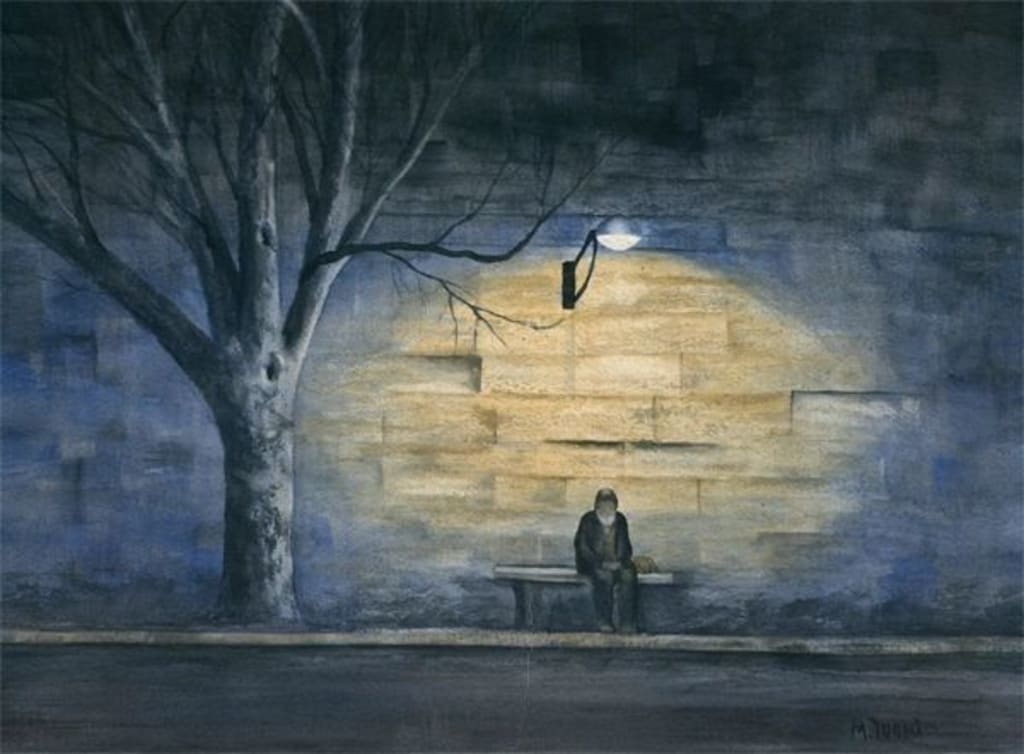The Big Deal about Loneliness
How a humans worst fear can be the gateway to Enlightenment

Loneliness. Loner. Outcast.
Loneliness has been a human phenomenon that has followed man kind like a dark shadow since the dawn of time.
Being a lone is fear that is so great, that so humans will refuse to even eat alone. It’s an idea that mind boggles society that is possible to enjoy one’s own company.
The Stigma of Loneliness
Loners have constantly been stigmatized within society. The barren childless widow, surrounded by her furry cats. The elder lady without a husband is given the unflattering term of ‘spinster.’ The unmarried middle aged inventor in his home reading books, covered in dust.
Reflecting back to our school days, it was everyone’s worst fear to be given the title, of ‘loner’. People were bullied for the sheer fact of not having friends. Many adults are haunted to this day of memories of skulking the school corridors, friendless and alone. Being someone who was popular and well liked, even if you were a rather unsavory person, made you instantly far more attractive than those not palatable to the group.
Why the stigma for the loner? What makes the loner so deeply unattractive? Why do we fear loneliness so much?
As a lover of human history and evolution, I will take it back to the days of prehistoric man.
The Biology of Rejection
Humans lived in groups, known as tribes. They were often made up of extended families, much like a wolf pack or a pride of lions. Human group structure is rather similar to wolf packs, with groups being led by an Alpha male/female and the presence of beings along the bottom of hierarchical structure. In a wolf pack these beings are known as the Omega, otherwise known as the kid that got bullied at school with few friends. The life of an Omega wolf mirrors this existence, being beaten, the last the eat, the first to be picked on, and often ostracized from the group.
Back to human society. If a member of a tribe was ostracized or rejected, it meant almost certain death. Without the warmth and protection of their tribe, a human would no doubt succumb to coyotes, hyenas, lions, and other monstrosities of the African desert. A fellow tribe member of course would dare not associate with the rejected member, lest they meet the same fate. It was far more effective to survive in a large group then in a coalition of maybe two or three humans.
A lonely human meant a doomed human. Certain death.
Because rejection was so dangerous for a human to experience, our brains have evolved so that feeling rejection causes sensations in the brain that mirrors physical pain. A University in Michigan conducted research and found that opioids, a natural pain killer released upon physical injury, is also released when an individual experiences social rejection. This occurs particularly in the amygdala, an area of the brain that manages our emotional experiences .
So loneliness is definitely not a laughing matter. There are evolutionary reasons for why it causes so much pain and is an avid member of feelings stigmatized in society.
Modern Day Society
Back to the 21st century. Loneliness does not mean that we will end up being eaten by a hyena, however it is still a feeling that is feared a great deal in society and shamed upon.
People tend to associate loneliness with an old aged pensioner, living alone with children far far away. This is an outdated idea. Many millennials, that could be described as a rather emotionally unavailable generation, are extremely lonely individuals and are actually the loneliest generation. This is massive paradox in comparison to the burst of the social media era.
In a YouGov report, 30% of millennials aged between 23 – 38 surveyed said they felt lonely, 22% said they had no close friends, in comparison to only 9% of baby boomers stating they had no friends.
The statistics are shocking, however what can be done in this loneliness epidemic? What healing, growth and expansion can we utilize in these circumstances?
Developing the Self
Loneliness is a painful sensation, that also has a negative stigmas attached to it. However, lets discuss introversion and extroversion. These are key factors in terms of truly defining loneliness.
Introverts are beings that thrive in their own company. They have an internal world that is visual, chaotic, and diverse. These people are over stimulated in environments that are busy, with lots of activity and are easily drained in social gatherings. They must be alone to recharge and are happy with a book or a documentary on their favorite topic.
Due to the loner stigma, introverts have had a hard time. Society has struggled to place them and would rather disregard this quiet and sensitive individual for the louder and more voracious extroverts.
Extroverts need external stimulation to thrive. Their energy is outward. They need conversation, fun, they need to socialize, they need activities with other humans. Extroverts tend to be confident, have many friends and in society are our TV presenters and Reality TV stars, etc. Society finds extroverts more fun, a social archetype widely celebrated, while the introvert, creating social media, developing vaccines, creating mind blowing technology, is left to the corner to read their favorite book.
There is neither wrong with either expression of self, as both are valid. But often, introverts wonder if there is something wrong with their make up and who they are, as society prefers their extroverted cousins. They may even fight their natural make up, in order to fit in. To the Introverts reading, there is nothing wrong with who you are. Your expression of self is equally valid.
Of course, introverted expression is more like to thrive in isolation. Finding out new discoveries, conducting research, writing, etc, whereas an extroverted would extremely struggle to be alone for a long period of time. In a society that shows preferential favor towards extroversion, could this also be why being a lone is so stigmatized? An extrovert’s worst nightmare is to be alone. An extrovert, with their confident and social nature would surely perish.
Either way, all humans need some form of social contact. Our skin needs to be touched, our feelings and thoughts, heard. But is being alone actual loneliness? Can one be alone…without being lonely?
Being Alone versus Being Lonely
This is where the confusion amongst loneliness truly remains. The association with being alone automatically meaning that you are lonely.
This is not the case.
Lets define loneliness.
Loneliness is sensation felt when a being is not sharing anything meaningful to the others around them. When I say meaningful, something that is meaningful to them.
For example, Person A absolutely loves knitting. When they share their love of knitting to a Person B that would rather watch a game of football, chances are that this person is going show little to no interest in their knitting hobby. This knitting champ now feels perhaps dejected, rejected and alone. Prior to sharing their knitting love affair, they were quite happy to knit in solitude, just enjoying themselves. When sharing this information with someone else however, they now felt somewhat useless.
This is why, a person can feel lonely in a crowd, in family, in a relationship, in a job and in a social gathering.
This is why a person can feel lonely around people. If you are not sharing yourself with humans that are accept who you are, or care for who you are, this can lead to much sadness and rejection and feeling very misunderstood. In fact, when you share yourself with beings that do not celebrate you, you can end up in a downward spiral of self loathing and self hatred.
You may ask what is wrong with me? Why can I not be different, so I can be liked and accepted?
This is very dark. This is why, I wanted to state that being alone is not often as bad as being around humans that can make you feel alone.
The more unique and different a person is, the more lonely they are likely feel. This is due to having less and less people that are on their wavelength, that is willing to understand their way of thinking, or also shares a similar way of thinking. They are less within the common touch.
Now if Person A had shared their knitting affair with someone who also loves knitting, they would be been sharing their love and joy with another being, celebrating their hobby and their existence. Or even so, if this person had shared their knitting hobby with someone who perhaps was not a knitting fan, but was interesting in unique past time activities, they would have felt happy. If they stayed knitting, in perfect solitude and bliss, they would have stayed happy.
Being alone does not mean you are lonely and being around people does not mean you are happy.
People often stay in abusive relationships, unhappy marriages, selfish friendships, loveless relationships, simply because they are scared of being alone. They are not understanding the misconception that if they with a being that is abusive, unkind, not accepting, and not loving, then they are already alone. No doubt, in these situations, they are probably experiencing loneliness.
A Journey of Self Discovery
Being alone does not have to mean loneliness. As with Person A, if they had stayed alone knitting rather than seeking out a being for the sake of another being, they would not have experienced sadness, dejection, and rejection for their unique expression of self.
Being alone is an opportunity to discover your sense of self.
When you are alone, the noise is cancelled out. You go deep within and find out what you like, and what you dislike, what makes you smile, what makes you sad. You go deep within your soul and find out what makes it spring for joy.
Loneliness is not satiated by the company of other humans. Loneliness is only satiated when we are around humans beings who, love, honor and accept us for who we are.
And if we don’t know who are, then how can we be loved for it? If we don’t know what is meaningful to us, then how can we find other people that we can share ourselves with?
Being alone offers an opportunity to understand who you are and begin to love and accept this individual. Being alone is a chance to understand your individuality, therefore any connections you have are more meaningful, satiating loneliness.
You know longer seek out beings simply because you are scared of being alone, ending up trapped in a vicious cycle of rejection or dissatisfaction. You are happy within your own company. You understand who you are and are able to pick and choose which humans you choose to align yourself with, as you are already aligned with you are.
You are able to share what is meaningful to you with others, as your alone time allowed you to discover this.
Healthy relationships are not about co-dependency. Its two humans coming to together to share their experience of life together.
I want to briefly touch upon the experience of Person A, sharing their knitting love with the uninterested football fan. They may have felt a state of self loathing, as their unique expression was not part of the common touch.
It is not about who you are being popular and common. Life loves diversity. Billions of different animals and trees and plants etc. Yes, some expressions are more common then others, but this individual only felt self-loathing as they felt who they are was not acceptable, merely as they had not been met with acceptance.
We only feel unacceptable when we meet others do not accept us for who we are.
When you are alone, you have an opportunity to love and accept who you are, first.
You must accept and love who you are as an individual. This will allow you to remove and avoid those who are destructive and harmful, but also protect you from those who do not love you.
When you love and accept yourself you instantly understand no matter how different you are, you are worthy of love, kindness, and respect, and you will immediately disregard the opinions of anyone who does not wish to meet you on this vibration.
Self-loathing is the internalized of rejection from others. It is self-rejection, and it attracts more rejection.
Being alone is an opportunity to heal the internalized assaults of others. Remove this, and you will find unconditional love underneath.
Being alone is an opportunity for self-acceptance. Self acceptance attracts love and acceptance from others.
If self acceptance attracts love from others, then surely everyone is acceptable?
Final Thoughts
Loneliness is not an outcome of being alone, but actually an outcome of being around people who do not love and accept us for who we are. It is also an outcome of being disconnected from yourself. The saying goes, we cannot be lonely if we like the person we are alone with.
Are you able use your alone time to self reflect? Which parts of yourself do you deem to be unacceptable? Which relationships are you hanging onto simply out of fear of being alone? Are you able to truly love and adore who you are? Do you feel at the mercy of the opinions of others? Are their people in your life who make you feel alone?
May your alone time lead you to deep, unconditional self love that comes from within.






Comments
There are no comments for this story
Be the first to respond and start the conversation.